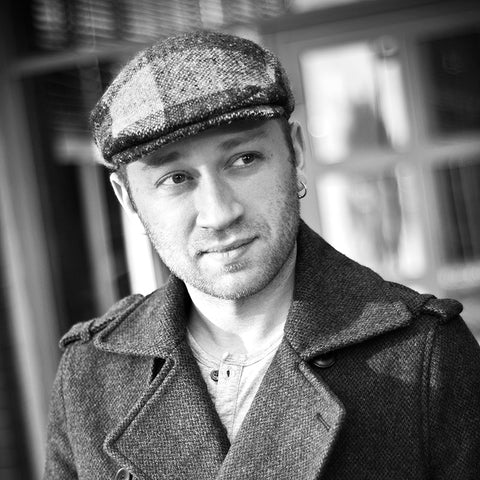Get to Know Mat Marquis
Oct 05, 2018

Up next in our series, we get to know Mat Marquis—author of our brand-new Brief, Image Performance (and catch his first book, JavaScript for Web Designers). He shares his thoughts on typing for a living, how he recharges, and the advice from his dad that has stuck with him over the years.

ABA: What’s the first thing you do every morning to start your day on the right foot?
Mat Marquis: Ah man, I feel like I’m supposed to have something about rising with the sun to greet the new day, eating precisely one cup of plain yogurt, and taking a brisk jog. Not that I drink two pints of cold brew and eat day-old baked goods over the sink while telling my, “dog to please calm down, buddy, c’mon, it’s first thing in the morning, we’ll go out in just a second.”
So, that first thing, I guess? Yep, yeah—I do the first thing, for sure.
ABA: In your opinion, what should someone consider before starting out in web design / development?
MM: I was all fire when I started out in this industry. I felt like I’d stumbled onto my shot at a life I was never supposed to have. I wanted to prove that I could be something I wasn’t “supposed” to be; I wanted to be the first one in my family to not just have a job with a desk, but to carve our name into it for all to see. The work felt important, and I felt important for doing it. The work came first—above all else. I’ve written about some of that, uh, elsewhere on the ABA blog. I kinda breezed over the aftermath there, though.
See, that kinda anger can only carry you so far, I figure. I woke up one day and it had run out. All of a sudden it was “just a job”—just making websites—and I was so tired. Sometimes I got to solve a little puzzle, and that was fun enough. Sometimes it was frustrating. I had unread emails and a meeting coming up a little later on, every day, forever. That’s still all it is, when you get right down to it: it’s a good job, for certain—one that I’m not only immensely grateful for, but one I enjoy doing, which is a huge, huge privilege. When you get right down to it, though? It’s nothing special, the work. We type for a living.
My advice is to sit with that idea for a bit, if you found yourself bristling there. I wouldn’t blame you for it.
I can only speak for myself, but the time I spent thinking that this work was itself something special—that the framework, the technology, the typing was so important—was time spent ignoring the impact the work can have—the impact that we can have. We have power over access, each and every one of us. Done right, our day-to-day, not-all-that-exciting work can mean that entire populations just setting foot on the web for the first time will be able to tap into the collected knowledge of the whole of mankind. I tell you: I care about that. I don’t care about writing JavaScript—at least, not any more than I care about “pushing a saw” or “swinging a hammer.” It’s just a tool, and using it is my job. But what you and I can do with those tools, though, together? The impact we can have? That’s something incredible—something important.
ABA: Is there anyone you’re following the work of right now, who you’d recommend others pay attention to?
MM: If you’ve ever put a font on the web—hell, if you’ve ever so much as used `font-family: sans-serif`—you’d be doing yourself a huge disservice not checking out all of Zach Leatherman’s work on web fonts and type. Jen Simmons and Rachel Andrews have long led the charge on CSS Grid—both in terms of the standards process itself and showing everyone how to put it to use.
ABA: In moments of self-doubt, how do you recharge and rally to keep going?
MM: I box, for one thing. Previously amateur level, nowadays just recreationally. I still keep up with the training and fight in the occasional smoker (just exhibitions—basically public sparring matches), but nothing sanctioned. I’m getting a little up there in years to be boxing competitively, and the dieting was—no pun intended, here—wearing real thin.
We’re crafty people, Lisa Maria Martin and I. I still manage to sneak in a little woodworking from time to time, though most of my tools are in storage—apartment livin’ and all. I like to tinker with my raggedy ol’ 1978 Bonneville here and there too, but y’know, same issue: can’t do much welding in an apartment.
I cook, too—got a food blog going and everything. I’m kind of a stress-baker, and due to a real bad case of it being 2018: I bake a lot lately. I got really into macarons over the summer—and I’ll take any excuse to make an over-the-top cake.

ABA: What tool, object, or ritual could you not live without to get you through a week?
MM: Oh, that’s an easy one: my KitchenAid Professional 6000 HD—the six-quart, with metal gearing. In red, of course.
ABA: Is there a piece of professional or life advice you’ve gotten that has always stuck with you? What is it?
MM: I remember working a job for Cambridge Housing Authority with my old man, when I was maybe sixteen? Old enough to clearly be the smartest person the world had ever known; y’know, that age.
It was a real patchwork kind of job: finishing a botched addition, leveling some sagging floors, replacing a deck that was hanging by a few nails, and so on—it was big enough that I think it was an open-ended “find it and fix it” kind of contract, which wasn’t common. I remember finding that out, and—again, I was sixteen and the smartest person in the history of geniuses—saying something to the tune of “well, in that case—oh ho ho—I guess that we should take our time here.”
My father said “that’s not what we do,” without looking away from his work. He only stopped to turn to me after I began arguing my extremely good and smart case: no, but, see, the city is footing the bill, and there’s so much work that they’d have no way of knowing how much had been done or how much was left to do, and—and nobody would even know.
“That is not,” he repeated, “what we do.”

